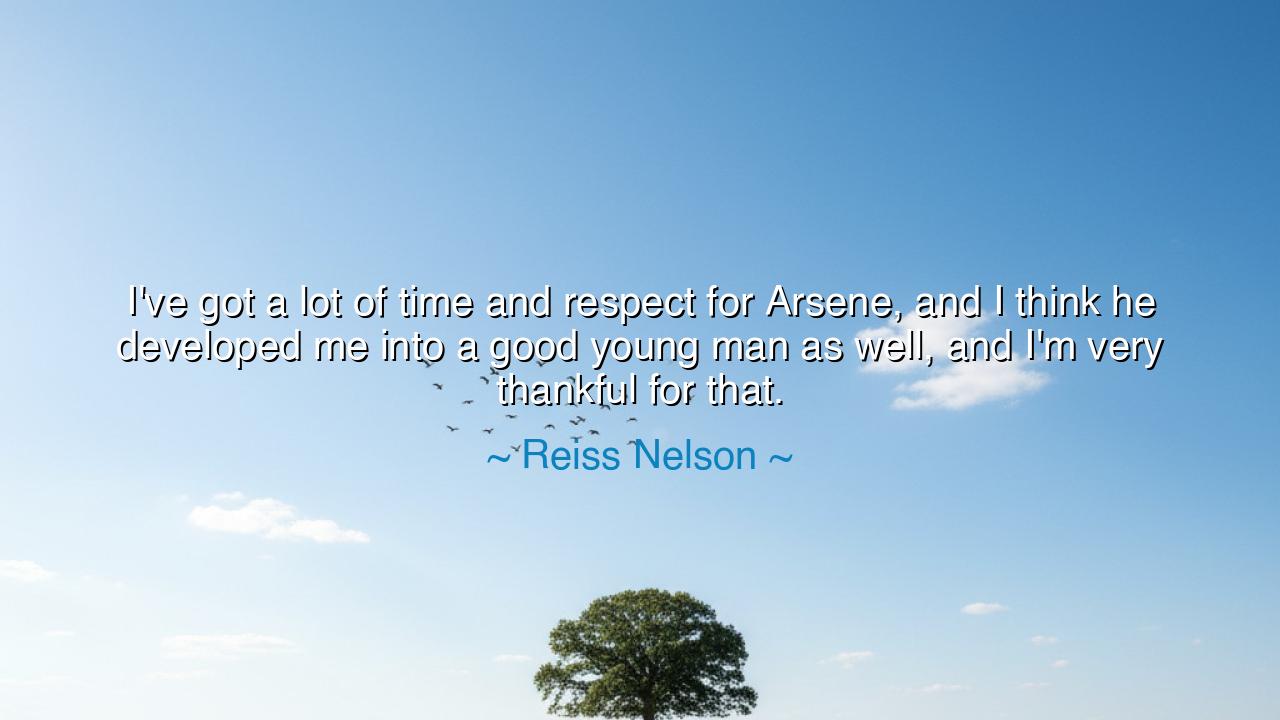
I've got a lot of time and respect for Arsene, and I think he
I've got a lot of time and respect for Arsene, and I think he developed me into a good young man as well, and I'm very thankful for that.






The words of Reiss Nelson carry the resonance of gratitude, a theme that has echoed across the centuries in the relationships between student and master, apprentice and teacher, disciple and guide. He says of Arsène Wenger: “I’ve got a lot of time and respect for Arsene, and I think he developed me into a good young man as well, and I’m very thankful for that.” These words are more than a tribute to a coach; they are an acknowledgment of the eternal truth that the hand of a mentor can shape not only skill, but character. For it is one thing to teach a man how to strike a ball, but quite another to teach him how to stand tall as a man.
To speak of time and respect is to speak of that precious currency which the young bestow upon their elders only when trust has been earned. Reiss Nelson does not merely admire Wenger’s tactical mind; he reveres the man who instilled in him discipline, patience, and wisdom. This is the ancient bond of mentorship, found in every culture, where the elder passes down more than knowledge—he passes down a way of being. Just as Socrates shaped Plato, and Plato in turn shaped Aristotle, so too did Wenger shape Nelson, not only as a player but as a good young man.
History is rich with such relationships. Consider Alexander the Great, who, though destined for conquest, was first guided by Aristotle. The philosopher did not simply fill his student’s mind with facts; he taught him the values of inquiry, reflection, and vision. Though Alexander’s empire was built on war, the spirit of his mentor lived on in his respect for learning, culture, and statesmanship. So too does Nelson’s testimony reveal that behind every great achievement lies a teacher whose influence reaches beyond the field, beyond the battlefield, beyond the classroom, and into the very soul of the student.
The power of Wenger’s role lies in the word developed. To develop is to unfold what is already within, to take raw potential and give it shape, direction, and purpose. This is the task of the mentor: to see what the youth cannot yet see in himself. Like the potter at the wheel, Wenger took Nelson’s raw clay—his energy, his passion, his untamed youth—and began to shape it into something enduring. The result was not only a footballer of promise, but a man of integrity.
What makes this gratitude even greater is Nelson’s awareness of it. Many pass through the fires of guidance without ever pausing to honor those who kindled their light. But Nelson declares himself thankful, and in doing so, he teaches us the value of reflection. To remember one’s teacher is to remember that no man rises alone. Behind every triumph are countless hours, words, and sacrifices offered by another. This humility is itself a mark of maturity, a sign that Wenger’s lessons took root beyond the pitch.
From this truth emerges a lesson for us all: seek out mentors, and when you find them, give them your time and respect. Listen not only to their instruction, but to the spirit with which they live. And when you, in turn, are called to guide another, do so not with arrogance but with patience and love, knowing that you shape not just a skill but a life. In every age, the strength of a community depends on this sacred chain—elders guiding the young, and the young honoring the elders.
Therefore, let each of us act. Recall the names of those who guided you—teachers, parents, coaches, friends—and give thanks. Speak your gratitude aloud, for it is a gift both to them and to yourself. And should you ever doubt the power of mentorship, remember Reiss Nelson’s words: that a great coach, a true mentor, does not merely create athletes or scholars, but good young men and women. Such is the eternal work of the guide, and such is the eternal duty of the student—to carry that gift forward into the future.
Thus, the wisdom of Nelson’s gratitude shines like a torch: honor those who shaped you, embody the lessons they gave, and in your time, become the flame that shapes another. For in this way, wisdom and character are passed through the generations, and greatness is not only achieved, but sustained.






AAdministratorAdministrator
Welcome, honored guests. Please leave a comment, we will respond soon